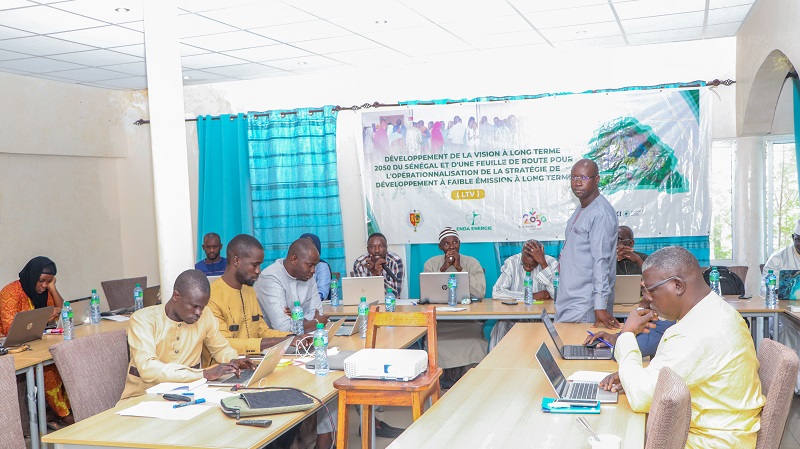What does a just energy transition mean for the world’s least developed countries where energy access, especially in rural areas, is a priority for national development?
Last week, a Just Energy Transition Partnership (JETP) between Senegal, France, Germany, and the EU was announced at the Summit for a New Global Financial Pact in Paris.
This means Senegal’s government has committed to reaching 40% of renewable energy in the electricity mix, in exchange for €2.5 billion ($2.7bn) from France, Germany, the UK, Canada and the EU.
As the director of the Senegalese think-tank ENDA Energie, my colleagues and I worked to ensure that this deal would not hinder Senegal’s national development goals and that energy access remains a priority of our country.
US ‘still on the fence’ as nations debate global shipping emission tax
First, let us address the elephant in the room – Senegal has been gearing up to become a major gas producer to help develop its economy.
It has been said that revenues from gas will help with the country’s investment in transport, electrification, health, and education. Other arguments for gas have asked whether Global North countries financing renewables in Senegal are merely dictating what we need to do, stopping us from being a prosperous country.
These arguments can be convincing but they are misleading. First, climate and development goals can be achieved together and second, we are changing the way international cooperation works. Our experience with JETP Senegal has given national actors the agency to actively participate in crafting an international deal with the Global North.
International cooperation between the Global North and the Global South is usually done with barely any inputs from the beneficiary countries. This must change if we want to see success in the implementation of such projects.
Public banks agree to check investments against countries’ climate plans
This is why we ensured that JETP Senegal is shaped by national actors. We led a process in Senegal that gathered a broad range of local stakeholders – from government, research, civil society, and the private sector – where we worked on a realistic vision for our country.
After a series of discussions we came to a consensus that 40% of renewable energy in the electricity mix is an ambitious yet achievable target, especially provided with international support.
This bottom-up approach has given us lessons on how international cooperation must be conducted. First, having a domestically inclusive and nationally-led process empowers countries like Senegal to achieve their vision for national development.
Instead of being treated merely as beneficiaries where climate targets are dictated to us, an inclusive process gives us the agency to decide, based on scientific data and the realities of our country, what can be realistically achieved without compromising on other national development goals. As a result, the JETP-Senegal has remained in line with our vision of universal energy access in the country.
Additionally, this bottom-up process creates buy-in into the vision from national stakeholders and given broader support, can help facilitate its implementation.
Given that the vision of the JETP was supported by different groups nationally through multi-actor dialogue, it ensures that the priorities remain the same over time, even through changes in government leadership. This is opposed to traditional top-down approaches that risk national and climate goals are abandoned as national leadership changes.
Unfinished paperwork is kneecapping solar’s potential in China
Second, aligning climate and development goals is crucial for developing and least developed countries. Exclusively focusing on climate targets is a lost opportunity for national development, especially when there is enough evidence to show that both can be achieved simultaneously.
Further, a narrow focus on climate targets is unlikely to garner support from domestic actors for the energy transition, especially in lower- and middle-income countries.
In Senegal, a country where 30% of households lack access to electricity (as of 2018), universal electricity access has been an important development goal. In this case, JETP aligns the target of 40% renewable energy with very ambitious targets for reaching universal electricity access by 2025
Third, we learned that while the focus on energy transformations is important to achieve national development, it is only one part of the solution. A clean, affordable and reliable supply of energy is a key driver of transformations in other sectors, including agriculture, industry and transport.
However, during the process of identifying Senegalese vision, we have also identified the need to transform agriculture, industry, and urban systems. JETPs are therefore not a one-stop solution and must be complemented by financial cooperation that will enable a low-greenhouse gas and resilient transformation of the whole economy. This is particularly so given that other sectors than energy experience even greater challenges in accessing adequate amounts of finance.
Our experience in leading the national process to achieve the best deal on energy transition in Senegal has been an opportunity to show how international cooperation should be conducted. Contrary to some arguments that the Senegalese have no say in international agreements like JETP, we were able to create an international agreement that was shaped by national actors. We are not just passive subjects, we will lead the way in shaping the future of our country.
Secou Sarr is the director of ENDA Energie
